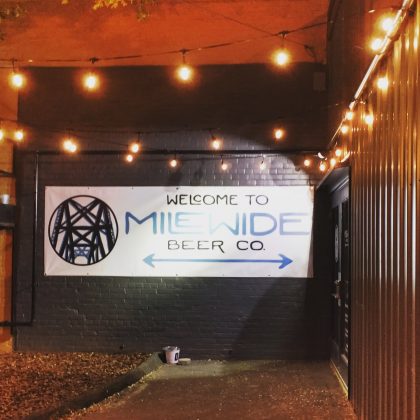Seated amid the cheesy 1960s-era veneer that delineates New Albany’s primary civic meeting room, idly monitoring a city council meeting, I was wishing there’d have been time at The Exchange for a third martini (sweet Jeeebus, why don’t they run a cash bar at functions like this?), when suddenly a beer discussion broke out on Twitter. My two cents quickly dispensed via the miracle of the iPhone, it was back to the numbingly predictable provincial political skullduggery
Then a friend tweeted.
“You own a brewery? I thought you were a city engineer or something.”
Sometimes I wonder myself. I’m the first to admit that during my first twenty years in the beer business, it was almost entirely about the beer, but during the past decade, it’s been far more about the business, and also about the way the world around us impacts both beer and business. The change surely owes to fundamental things that continue to apply as time goes by, and consequently, the old phrase “Think globally, drink locally” never has been quite as apt.
Beer is inescapably local, and it’s difficult to imagine NABC ever ceasing to be primarily a local business, even if we someday might grow to embrace a larger scale of production and a wider distribution area. That’s because my company is neither Mikkeller (the gypsy) nor Pabst (a contract brewer). We have two bricks ‘n’ mortar properties, buildings, restaurants and breweries, all of it firmly embedded in New Albany’s venerable riverside soil.
Both are tethered to utilities and sewers. Property taxes come due twice yearly on each. Our employees mostly live within a 20-mile radius. We’re in a place, and we’re about a place. It’s the way it is, even if this reality eluded my consciousness for many years, when my customary coping mechanisms included drinking beer from somewhere else and imagining I was there instead of here. Amid the burgeoning list of my potential epitaphs is this: “He proved to be an ineffective expatriate.”
Oddly, I’ve come to prefer it this way. Life as a gadfly amid the addled American grassroots can be frustrating at times, but also quite entertaining at others. Mine was never a mathematical and scientific brain, anyway; rather, history, geography and politics are my interests, and while I keep up on events on the wider national and international stages, it generally strikes me as a poor use of limited time to debate national issues, when it’s the smaller ones that impact you on a daily basis.
Hence, Roger as city engineer pretend, beer-themed localist, and pain in the ass of New Albany’s stunted body politic.
However, extending the overlapping circles further afield, from city to state, it’s also Roger as board member on a statewide guild, in Indiana, a place that can be quite frustrating at times – so much so that recently, involvement has become not only necessary, but downright urgent.
In 2008, Indiana reversed field after 44 years as a dependable red state and fell into the Obama camp by the slimmest of margins. In retrospect, this outcome proved to be a fluke. Soon both houses of the Indiana legislature had Republican super majorities, and as totalitarian regimes on our planet regularly remind us, two-party systems like America’s may be infuriatingly impotent, but one-party strangleholds are far, far worse.
All of which compels me to publicly thank NABC’s longtime friends at Upland Brewing Company in Bloomington for understanding that beer isn’t conceived or consumed in a vacuum, and publicly joining the ongoing struggle against HJR-3.
What is HJR-3? Freedom Indiana provides an overview.
HJR-3 (formerly HJR-6) is a proposed amendment that would permanently alter the Indiana Constitution to define marriage and could potentially affect hundreds of rights related to marriage under current Indiana law.
In the 2014 legislative session, Indiana lawmakers can choose either to table or vote down the amendment or send it to voters for a statewide referendum next November. If it does not pass or is not called for action, our Constitution will be protected.
In addition to the duplicative and restrictive first sentence of the amendment, no one has been able to clearly define what effects the second sentence would have on existing marriages, domestic partner benefits, human rights ordinances, legal contracts and benefits for unmarried couples.
HJR-3 is lamentable and abhorrent, and as a progressive beer guy, it’s a challenging time to fight against it. That’s because Republican legislators have been quite friendly when it comes to advancing the interests of craft brewing in Indiana, most prominent among them New Albany’s own Rep. Ed Clere (District 72).
And yet the world view advanced by HJR-3 is plainly damaging to business. I’ve had my differences with Rep. Clere, but from the start he has opposed HJR-3, and for this we’re all appreciative. Unfortunately, he’s a minority amid the GOP majority. It is striking that legislative supporters of HJR-3, including some disoriented Democrats (Steve Stemler of neighboring Clark County), are doing so against the wishes of businesses far larger than Upland, NABC or any Indiana brewery, including Eli Lilly and Cummins.
That’s right: Republicans legislating against the stated interests of Indiana business. Verily, it is a strange world we inhabit.
It is my view that if this madness goes to the voters, the Brewers of Indiana Guild as a whole should publicly and emphatically reject it. Upland currently does not have a director on the board, so I’ll happily be the one to make the motion if it comes to that. Let’s hope it doesn’t, and the Indiana GOP somehow becomes reacquainted with the notion of sanity. We’ll know soon enough.
What does all this have to do with beer?
Well, what doesn’t it have to do with beer?
As a purposefully intoxicating liquid, beer can indeed be a temporary escape from reality, but only if the drinker so chooses. When you’re in the beer business, there comes a time when it’s best for beer to play a different part: An immersion into reality. To be disengaged isn’t just counter-productive. It’s suicidal.
It’s why I insist that craft beer isn’t an invitation-only island, and moreover, it’s why I’ll take it a step further: If craft beer doesn’t embrace what’s right and reject what’s wrong, why the hell are we even bothering?





